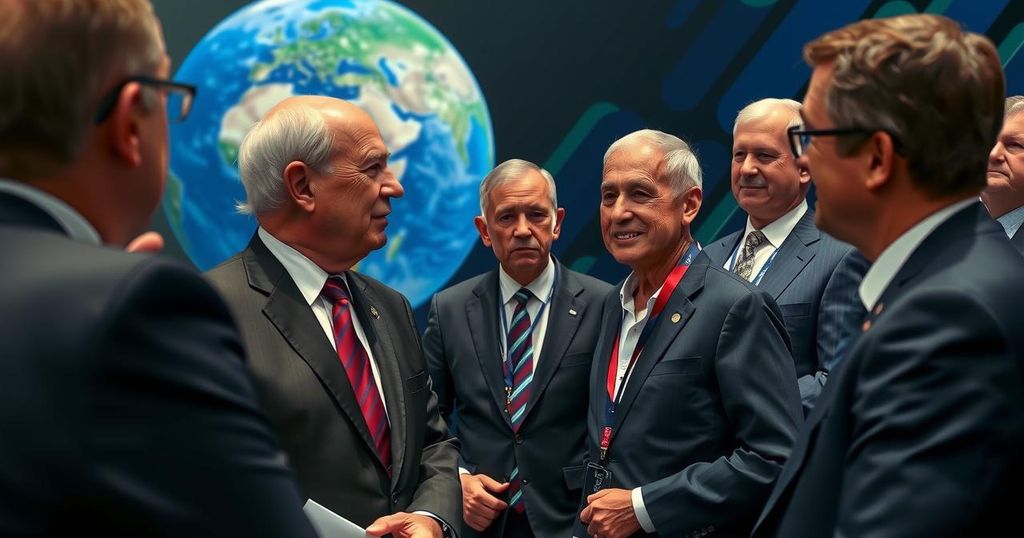Global news
AMERICA, ASIA - PACIFIC ECONOMIC COOPERATION, BIDEN, BRAZIL, DIPLOMACY, DONALD TRUMP, FOREIGN POLICY, GROUP OF 20, HOUSE, INTERNATIONAL RELATIONS, NEW YORK POST, NORTH AMERICA, PERU, SOUTH AMERICA, THE NEW YORK POST, TRUMP, UNITED STATES, US PRESIDENTIAL ELECTION, WASHINGTON, WHITE HOUSE, YOON, YOON SUK YEOL
Jamal Walker
0 Comments
Biden’s Final International Summits Amid Trump’s Return to Power
President Biden’s six-day trip to Peru and Brazil marks a significant diplomatic effort as his presidency concludes. Global leaders are focused on the implications of Donald Trump’s return, while Biden seeks to reaffirm international alliances through discussions on climate, security, and cooperation during key summits.
On Thursday, President Joe Biden embarked on a six-day diplomatic mission to Peru and Brazil, marking the concluding international gatherings of his presidency. This visit coincides with a palpable sense of anticipation among global leaders regarding the implications of Donald Trump’s imminent return to the White House. Attending the Asia-Pacific Economic Cooperation (APEC) summit in Peru, alongside his engagements in the Amazon rainforest and at the Group of 20 (G20) summit in Brazil, offers Biden an essential opportunity to confer with his international counterparts, reinforcing the ties he has cultivated over his tenure. As Biden engages in these pivotal discussions, world leaders remain acutely focused on Trump, assessing his anticipated national security and foreign policy appointees. South Korean President Yoon Suk Yeol expressed willingness to reconnect with Trump over golf, highlighting the eagerness of international leaders to employ familiar channels with the former president. “This is not going to be a swan song for Biden,” commented Erin Murphy, an analyst at the Center for Strategic and International Studies, indicating Biden’s unique position as a ‘super lame duck’ president with contrasting policies ahead. White House officials maintain that Biden’s agenda during the summits will be substantive, emphasizing dialogues on pressing issues such as climate action, global infrastructure, counternarcotics, and significant bilateral meetings—including a notable discussion with Chinese President Xi Jinping. White House National Security Adviser Jake Sullivan asserted, “He believes that America’s allies are vital to America’s national security.” Meanwhile, Biden will strive to reaffirm U.S. commitments to allies, particularly in relation to the ongoing conflict in Ukraine and regional tensions in Gaza and Lebanon. Additionally, Biden’s visit to the Amazon, a historic first for a sitting U.S. president, underscores his commitment to environmental issues. Political consultants predict Biden will seize this moment to assure the international community of the stability of democratic transitions of power. Meetings with Xi are particularly consequential, with their last direct dialogue occurring in California during the previous APEC summit. Biden’s ongoing effort to maintain a constructive relationship with China will be tested, especially against the backdrop of Trump’s proposed economic measures and the administration’s concerns over China’s alleged military assertiveness and involvement in supporting Russia amidst its invasion of Ukraine. The importance of these discussions cannot be overstated as they shape not only bilateral relationships but also global political dynamics as nations anticipate the incoming administration’s stance. As social, economic, and political landscapes evolve amidst the shifting powers, Biden’s engagements signify a reaffirmation of U.S. alliances and strategies during a period of transition. By addressing the overarching geopolitical complexities that define this moment, Biden seeks to cement his legacy on the international stage while providing reassurances to longstanding allies in a democratically fluctuating environment.
President Joe Biden’s six-day journey to Peru and Brazil occurs as his presidency approaches its twilight, providing him a critical platform to engage with world leaders. This visit holds historical significance as it takes place against the backdrop of Donald Trump’s impending return to the presidency, prompting a range of reactions among global powers. Leaders are assessing the potential shifts in U.S. foreign policy, especially concerning relations with nations such as China and Russia, while enhancing discussions on global security and cooperation in critical areas such as climate change and infrastructure development.
In summary, President Biden’s visit to Peru and Brazil represents a significant diplomatic endeavor as he approaches the end of his presidency. It serves not only as a platform to reinforce international alliances but also as a critical engagement point ahead of Trump’s anticipated return to power. The dynamics of these interactions, particularly with key figures like Xi Jinping, will have long-lasting implications for global politics as leaders navigate a pathway through the complexities of cooperation, security, and diplomatic relations in a transitional era.
Original Source: www.opb.org




Post Comment